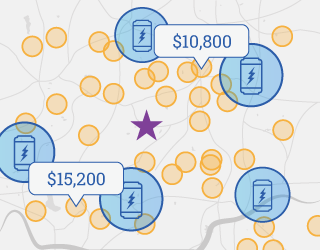More and more homeowners are looking for ways to improve the resilience of their home’s electricity systems. Historically, many people who wanted backup power for their homes in the event of an emergency–think natural disasters and other outage events–looked to back up generators for that resilience. These days, however, homeowners are increasingly looking to energy storage systems, and solar plus storage systems in particular, for that peace of mind during outages.
Despite providing the same benefit of backup power, it can be difficult to compare the two different technologies: backup generators vs. solar + storage installations. With that in mind, earlier this year, we contributed to a report published by Vote Solar, Resilient Clean Energy for California, which includes a section that focuses on the costs and benefits of both technologies. Using that report as a guide, we decided to compare backup generators and solar + storage by doing the math.
The case for backup power
In many parts of the country, the case for purchasing a backup power solution is clear. In California, wildfires and public safety power shutoffs look set to persist for at least the next decade according to scientists and public officials in the state. Each of those can cause prolonged power outages for millions of utility electricity users at homes and businesses across the state. In the Southeast, the increased frequency and severity of hurricanes has led to more outages as well, paired with an increasing demand for backup power solutions. And in the Northeast, many parts of the region experience outages during the winter when strong winds coupled with ice storms lead to snow-laden tree limbs taking down power lines.
In each of these instances, a backup generator or solar plus storage installation could keep the lights on in homes during the outage itself. And remember, solar panels on their own aren’t enough to provide electricity during an outage. Check out our video on the subject to learn more.
Backup generators vs. energy storage
There are two primary reasons that homeowners have historically opted for backup generators. First, they cost less upfront than other options for providing backup power for your home. Second, in the past, generators have been very easy to find and set up at your home: in fact, you can frequently buy backup generators at home improvement stores, and some might not even need to be installed by an electrician.
However, backup generators come with a number of downsides. For one, you’ll have to ensure you have the fossil fuel they run on accessible and on hand in anticipation of an outage, which can be tough to do when outages are, you know, unexpected. Next, backup generators are large, loud machines that aren’t meant to be run every day, meaning you only benefit from having them in the event of an outage. Finally, and perhaps most importantly, by burning fossil fuels backup generators cause significant local pollution, not the least of which is carbon monoxide, which has become a large safety risk with fossil fuel powered backup generators.
Batteries, on the other hand, are more expensive up front and require an electrician to install but solve for all of the issues that can potentially plague backup generators. First, when paired with solar panels, they are powered by the sun, which means the battery can be refilled every day so long as the sun keeps shining. Batteries are very quiet and can provide value to you every single day, especially in places like California where when you have solar, the electricity you pull from the grid when the sun is down can be more expensive than the electricity you put onto the grid when the sun is shining. And, finally, there are no local emission concerns with solar & storage installations–they run entirely on clean, renewable solar power.
Doing the math: backup generators vs. energy storage
As mentioned above, this section draws heavily on Vote Solar’s Resilient Clean Energy for California report, which EnergySage contributed to for this particular section. At a high level, there are a few key benefits between a solar + storage installation and a backup generator financially. Solar plus storage provides value every day, is fueled by the sun instead of purchased gasoline or diesel, is eligible for tax credits and incentives, requires very little to no maintenance, and is often less expensive than grid power or than purchasing a fossil fuel to use.
It’s important to consider the overall benefits of solar + storage beyond just providing backup power when comparing backup generators to energy storage systems. As written in Vote Solar’s report in comparing a home with a 5 kilowatt solar panel system & two Tesla Powerwall 2 batteries with a home with a 3.5 kilowatt gasoline backup generator: “The bottom line is that the solar + storage home has a 20-year cost that is more than $22,000 less than the home with the backup generator.” Even without battery incentives, a solar + storage homeowner still saves compared to the backup generator home, in large part due to the energy savings from solar.
We’ve reproduced a table from the Vote Solar report below that compares the 20 year cost for backup generators vs. solar plus storage. Though the solar plus storage installation has higher upfront costs, it more than makes up that difference over 20 years in bill savings, as well as in avoided maintenance and fuel costs.
Explore solar plus storage options on EnergySage
Interested in backup power, or in reducing how much you pay for electricity? Get started comparing your solar plus storage options on EnergySage today. Estimate your bill savings from solar with our Solar Calculator. And to receive custom solar + storage quotes, register for a free account on the EnergySage Marketplace.






